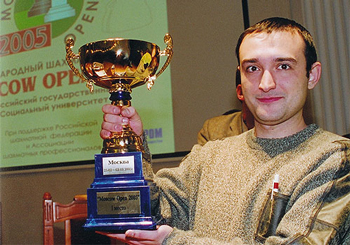Farrukh Amonatov:
«Moscow open helped to discover Swiss!»

The leader of the national team of Tagikistan has been living in Moscow for a long time, but for many years his success was connected with rapid chess till 2005 when he won Moscow Open that had just been included on the chess calendar.
Whatever people say, the composition of players of that tournament was not that weak: 209 par-ticipants, over 20 Grand Masters, hot contest till the very last round and a strong “golden” victo-ry of Farrukh in the last round. It is interesting that Amonatov is the only chess player of three first winners is included on the list of ten Elo-favourites of the tournament 2008. And it is quite probable that he will try to repeat his success of 3 years ago. Now he has an experience of playing at the highest level!
– What reminiscences do you have of the victory in Moscow Open 2005?
– Oh, the victory was memorable. If I am not mistaken, it was my first victory in a Swiss! At that time I had to beat Khismatullin in the last round who had scored 0,5 more. I have gathered myself up – and…won!
I don’t remember the detailes of that tournament. I just remember that there was this thrill of anticipation in Moscow, - indeed there was no other decent tournament in Moscow but for Aeroflot Open during many years, we always had to travel somewhere, and suddenly… Thanks to Zlochevsky and Gleck who managed to promote the idea.
It was pleasant to win in the first Moscow Open, this victory added confidence and strength; I had not loved Swiss tournaments before, and after that I started to take part in them on a regular basis and won!
– As for the next two tournaments, did you try to sustain the status of the first winner?
– Yes, to a certain extent. I felt obliged to play every time. Although the word “obliged” is not very suitable here. When I have a chance to play without traveling anywhere –it is happiness. And, of course, I would like to win once again. I didn’t manage to do it so far. And one of the main reasons for this is the composition of players of Moscow Open which is becoming stronger every year.
If you remember, not too many Grand Masters played in the first tournament (somebody just didn’t know), in the second one – there were more of them, and it is expected that there will be almost one hundred of them in the third one…
– What is the difference between Moscow Open and other Swiss tournament?
– First of all - a mass character of the tournament. I don’t remember any other tournament where so many people play, even Aeroflot. And then, the atmosphere here is very friendly; there is not this usual overstressing. The organization is always on a very high level.
– And what about various formats of the tournament?
– It is very interesting, though I have never taken advantage of it; all three times I played ac-cording to the usual pattern -9 days. But for many strong Grand Masters that are going to play in Aeroflot or Kapela after Moscow Open, it is very important – it is not easy to play properly 18 games, and here you can save pains.
Why did I never start with rapid chess, although displayed good results? I don’t even know – probably it is just a habit. “Classics” is after my own heart, so why should I mix everything?
– Why are other tournaments not held according to this format?
– They are just used to it: they are just following the same old way; they don’t want to change anything. And then, classical chess is a classical chess. Not everybody relies on rapid chess, and it creates extra problems to organizers – they have to organize not one but actually three tourna-ments. And I also remember all the difficulties for arbiters in summing up the results of all the three tournaments.
– And the organizers of Moscow Open are probably not afraid of difficulties?
– Obviously they are not, if they carry out the tournament. In general, I would evaluate the or-ganization as one of the best of those Swiss tournaments I had a chance to take part…
– What is it necessary to do to attract strong players to the tournament?
– Every Grand Master has its wishes. Somebody wants to struggle for a big prize fund; somebody does not want to lose rating points. It is not a question to me. But everything that has been done during these three years, improves the tournament, and makes it more attractive for strong chess players. Take, for example, a prize fund which is increased in times every year.
– What would you point out in the first paragraph of the advertising booklet of Moscow Open?
– The prize fund, conditions, reception and … an individual approach to every player!
– I assume you will continue playing in this tournament?
– I like this tournament! But I cannot say whether I will take part in it on a permanent basis, but if the circumstances are in my favour, I always know what to do at the beginning of February!
Evgeniy Atarov
|


